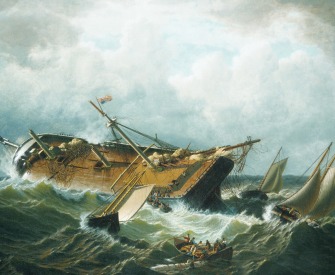Our ship was now all cased with ice—hull, spars, and standing rigging—and the running rigging so stiff that we could hardly bend it so as to belay it, or, still worse, take a knot with it, and the sails nearly as stiff as sheet iron. One at a time (for it was a long piece of work and required many hands), we furled the courses, the mizzen topsail, and fore-topmast staysail, and close-reefed the fore and main topsails, and hove the ship to under the fore, with the main hauled up by the clew lines and bunt lines, and ready to be sheeted home if we found it necessary to make sail to get to windward of an ice island. A regular lookout was then set and kept by each watch in turn until the morning. It was a tedious and anxious night. It blew hard the whole time, and there was an almost constant driving of either rain, hail, or snow. In addition to this, it was “as thick as muck,” and the ice was all about us.
The captain was on deck nearly the whole night and kept the cook in the galley with a roaring fire to make coffee for him, which he took every few hours, and once or twice gave a little to his officers; but not a drop of anything was there for the crew. The captain, who sleeps all the daytime and comes and goes at night as he chooses, can have his brandy and water in the cabin and his hot coffee at the galley, while Jack, who has to stand through everything and work in wet and cold, can have nothing to wet his lips or warm his stomach. This was a “temperance ship,” and like too many such ships, the temperance was all in the forecastle. The sailor, who only takes his one glass as it is dealt out to him, is in danger of being drunk, while the captain, who has all under his hand and can drink as much as he chooses, and upon whose self-possession and cool judgment the lives of all depend, may be trusted with any amount to drink at his will. Sailors will never be convinced that rum is a dangerous thing by taking it away from them and giving it to the officers—nor that temperance is their friend, which takes from them what they have always had and gives them nothing in the place of it. By seeing it allowed to their officers, they will not be convinced that it is taken from them for their good, and by receiving nothing in its place, they will not believe that it is done in kindness. On the contrary, many of them look upon the change as a new instrument of tyranny. Not that they prefer rum. I never knew a sailor in my life who would not prefer a pot of hot coffee or chocolate in a cold night to all the rum afloat. They all say that rum only warms them for a time, yet if they can get nothing better, they will miss what they have lost. The momentary warmth and glow from drinking it, the break and change which is made in a long, dreary watch by the mere calling all hands aft and serving of it out; and the simply having some event to look forward to and to talk about give it an importance and a use which no one can appreciate who has not stood his watch before the mast. On my passage around Cape Horn before, the vessel that I was in was not under temperance articles, and grog was served out every middle and morning watch and after every reefing of topsails, and though I had never drank rum before, and never intend to again, I took my allowance then at the capstan, as the rest did, merely for the momentary warmth it gave the system and the change in our feelings and aspect of our duties on the watch. At the same time, as I have stated, there was not a man on-board who would not have pitched the rum to the dogs (I have heard them say so, a dozen times) for a pot of coffee or chocolate, or even for our common beverage—water bewitched, and tea begrudged, as it was. The temperance reform is the best thing that ever was undertaken for the sailor, but when the grog is taken from him, he ought to have something in its place. As it is now in most vessels, it is a mere saving to the owners, and this accounts for the sudden increase of temperance ships, which surprised even the best friends of the cause. If every merchant, when he struck grog from the list of the expenses of his ship, had been obliged to substitute as much coffee or chocolate as would give each man a potful when he came off the topsail yard, on a stormy night—I fear Jack might have gone to ruin on the old road.
From Two Years Before the Mast. At the age of nineteen in 1834, Dana took leave of Harvard College and became a common sailor aboard a ship bound for California by way of Cape Horn. He resumed his formal education two years later and was admitted to the Bar in 1840, the same year he published his account of life at sea. It was a success on both sides of the Atlantic, eventually netting some $50,000 for the Harper publishing firm—to whom Dana had sold all the rights for $250. Herman Melville called the book “unmatchable.”
Back to Issue





